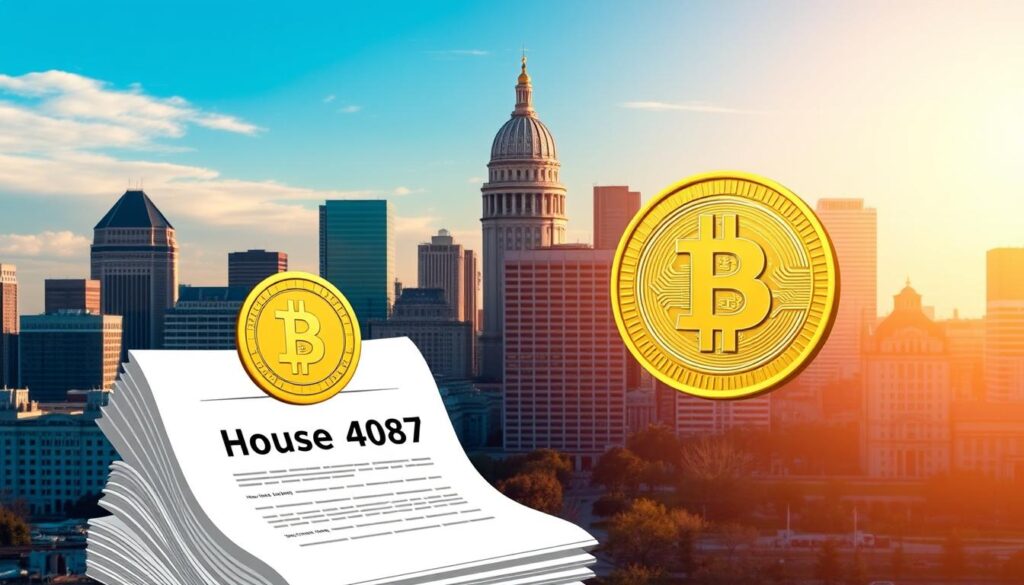Impact of House Bill 4087 on Cryptocurrency: Michigan’s Bold Move
The impact of House Bill 4087 on cryptocurrency could redefine how U.S. states interact with digital assets. Michigan’s legislature is considering a groundbreaking proposal that allows the state to invest a significant portion of its financial reserves into Bitcoin and other cryptocurrencies. If enacted, this move could mark one of the most notable steps toward state-level crypto adoption in the United States.
What is House Bill 4087 and Why Does It Matter?
House Bill 4087, introduced by Representatives Bryan Posthumus and Ronald Robinson, proposes amending Michigan’s Management and Budget Act to authorize the state to allocate up to 10% of its funds into cryptocurrencies such as Bitcoin. This legislation would establish Michigan as a leader in digital finance and potentially encourage other states to follow suit.
Currently, around 20 U.S. states are exploring similar legislation aimed at creating crypto reserves. Michigan’s proposal places it at the forefront of this movement, signaling that Bitcoin is no longer viewed merely as a speculative asset but as a strategic financial reserve similar to gold.
If fully implemented, Michigan’s cryptocurrency reserve could represent an investment worth approximately $23 billion, translating into nearly 247,000 BTC at today’s prices. This would make Michigan one of the largest institutional Bitcoin holders in the U.S.
Key Components of House Bill 4087
The bill outlines a structured approach to building and managing Michigan’s state-backed cryptocurrency reserve. Some of its most important elements include:
- Investment Allocation: Up to 10% of state funds can be directed toward Bitcoin and other approved digital assets.
- Regulatory Oversight: Establishing strict compliance protocols under state financial laws.
- Infrastructure Requirements: Building secure blockchain systems to safeguard the state’s holdings.
- Risk Management: Implementing multi-layered security measures to prevent hacking or mismanagement.
- Transparency & Accountability: Regular audits and reporting to ensure responsible handling of taxpayer funds.
According to CoinDesk, institutional crypto adoption is accelerating across the U.S., and state-level reserves could add a new dimension to this trend.
The Broader Trend: States Viewing Bitcoin as Digital Gold
Michigan isn’t alone. Other states, including Texas, Florida, and Ohio, have introduced bills exploring the use of cryptocurrencies as part of their reserves. This wave of legislation comes after recent federal signals, such as executive orders supporting digital asset innovation.
The impact of House Bill 4087 on cryptocurrency markets could be substantial. A coordinated state-level adoption of Bitcoin could drive demand, influence prices, and reshape the narrative around Bitcoin as a legitimate store of value rather than a speculative investment.
For comparison, if just seven states allocated 10% of their reserves to Bitcoin, the market could see an injection of over $100 billion in liquidity. This would significantly affect Bitcoin’s supply-demand dynamics.
Potential Economic Benefits for Michigan
- Portfolio Diversification: Reduces reliance on traditional financial instruments like bonds.
- Inflation Hedge: Bitcoin’s capped supply makes it an attractive option in times of monetary uncertainty.
- Innovation Hub: Could attract blockchain companies, developers, and investment funds to Michigan.
However, the plan is not without risks. Volatility in crypto markets remains high, and critics argue that taxpayer money should not be exposed to such fluctuations. Still, proponents view this as a forward-thinking strategy for long-term growth.
Internal Analysis and Future Outlook
If Michigan’s HB 4087 succeeds, it could trigger a domino effect among other states, accelerating institutional Bitcoin adoption and paving the way for broader crypto integration in public finance. As states treat Bitcoin like digital gold, we may witness a historic shift in how government treasuries diversify assets.
A future where states hold crypto reserves could also pressure federal regulators to create clearer, more robust frameworks for digital asset custody, taxation, and security.
FAQ: Impact of House Bill 4087 on Cryptocurrency
What is the impact of House Bill 4087 on cryptocurrency adoption?
It could significantly accelerate state-level Bitcoin adoption, legitimizing digital assets as part of official financial reserves.
How much could Michigan invest in cryptocurrency under House Bill 4087?
The bill authorizes investing up to 10% of state funds, potentially amounting to $23 billion in Bitcoin and other cryptocurrencies.
Why is Michigan considering a cryptocurrency reserve?
Michigan aims to diversify its investment portfolio, hedge against inflation, and position itself as a leader in financial innovation.
What risks does House Bill 4087 pose for Michigan?
Key risks include market volatility, cybersecurity threats, and the need for strong regulatory oversight to protect taxpayer funds.
Could other states follow Michigan’s lead after House Bill 4087?
Yes, many states are already exploring similar bills. Michigan’s move could set a precedent for widespread adoption of state-backed crypto reserves.
Conclusion: A Pivotal Moment for State-Level Crypto Adoption
The impact of House Bill 4087 on cryptocurrency markets extends far beyond Michigan’s borders. If approved, this legislation could mark a turning point in the evolution of public finance—transforming Bitcoin from a speculative asset into an institutional reserve held by state governments.
As policymakers weigh the benefits and risks, one thing is clear: Michigan’s bold step could shape the future of digital assets in the U.S., influencing both regulatory frameworks and market dynamics.

